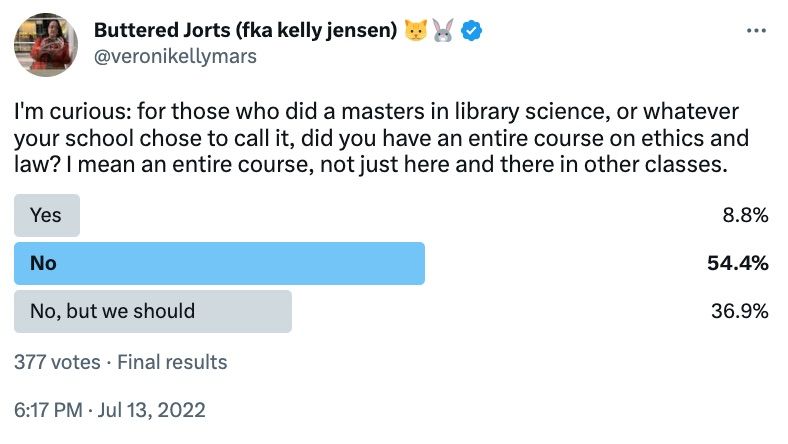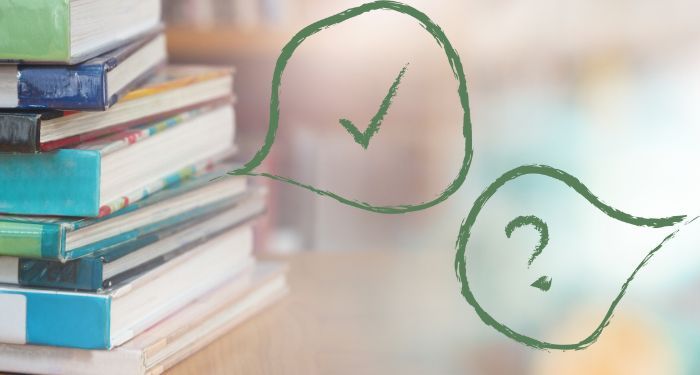I’m currently enrolled in my second master’s program. I attended a top-five program for library and information science in the late 00s, earning my Master of Science in Information Studies. Graduating at the height of the first once-in-a-lifetime recession meant that it took me longer to find a job in libraries than it may have otherwise. Or maybe it didn’t–for decades, the myth that librarians would be retiring in troves rolled through library masters programs and as of yet, that has come no where near being true. It’s as likely now that if a librarian can retire, when they do, their job is either dissolved completely or their tasks are parsed out to colleagues who are already overworked and underpaid.
But I digress.
My program in clinical mental health counseling has been a study in a very different field. It’s not because it’s an online program; plenty of library programs have been that way for decades, even though I attended one of the few that was, and remains, entirely in person. Instead, what makes this program different is how much oversight there is in the curriculum from both the professional organization and the accrediting body, Council for Accreditation of Counseling & Related Educational Programs (CACREP). There is a set series of courses that every person enrolled in such a program across the country must take, with specific assignments and tasks to be done in order for the education to be as close to parity no matter if you go to a pricy institution or, like me, narrowed down you top choices to the least expensive (my program is incredible and one of the most affordable).
Among the required courses for CACREP accreditation is a course on the laws and ethics of counseling. It’s a course taken early in the program, meant to not only familiarize therapists-to-be with the various ethical codes put forth by counseling professional organizations but it’s meant to discuss legal guidelines for practicing and encourage robust discussion, thinking, and writing about real-world ethical challenges that emerge in the course of one’s working life.
Each week, we read about various ethical dilemmas, and we concluded the course with a major paper outlining the steps we would take in a provided scenario. We had to not only use and explain our ethical decision-making model with the scenario, but we had to seek guidance from a licensed professional in the field for further insight.
The course was difficult but incredibly rewarding and the discussions held there have echoed through every course in the program since.
**
There is a bare bones Code of Ethics for librarians as outlined by the American Library Association (ALA). The code, which focuses on upholding the standards of intellectual freedom, focuses far more on the institution of the library than it does on the ethical practice of those who work within the world of libraries. It is important, indeed vital, that librarians recognize the inherent dignity of all and that their personal convictions cannot superceed those whom they serve. The ethical codes here are good.
However, there is not a single ethical mandate here covering the topic of self-care. Indeed, the only mention of the interests of the individual librarian is to be nice to colleagues and, perhaps most tellingly, to seek out trainings, professional development, and encourage others to join the field. The American Counseling Association, by comparison, has an entire section mandating the need for therapists to practice self-care in order to bring their best, most healthy selves to their workplace. There is little question that such oversight is why librarians are often subject to vicarious/secondary trauma, burnout, and compassion fatigue; there is simply not a mandate that they seek or be given opportunities to help themselves if it’s not at the expense of the profession.
Masters programs which credential library workers across all types of libraries–public, school, special, and academic–do not have a set course plan for those who enroll. Although the ALA accredits programs and the accreditation process has been (and continues to be) updated in recent years, there is not a standard core curriculum required of programs across the country:
The Standards are limited in application to assessment of graduate programs of library and information studies that lead to a master’s degree. Identified are the indispensable components of library and information studies programs while recognizing programs’ rights and obligations regarding initiative, experimentation, innovation, and individual programmatic differences. They are are indicative, not prescriptive, with the intent to foster excellence through a program’s development of criteria for evaluating effectiveness, developing and applying qualitative and quantitative measures of these criteria, analyzing data from measurements, and applying analysis to program improvement. The Standards stress innovation and encourage programs to take an active role in and concern for future developments and growth in the field. The requirements of the Standards apply regardless of forms or locations of delivery of a program.
The nine page guide to the standards necessary to acquire ALA accreditation use the word “ethics” twice. In both instances, ethics are called to be embedded within the curriculum and students who graduate will emerge knowing what they are.
My program did not have a course on ethics or the law as it pertains to libraries. Were those topics covered in other core classes? They were. But was an entire course dedicated to working through the decision-making models taking ethics and laws into account? Nope. And even today, 15 years later, the only required core course in the program is a “Perspectives on Information,” which most likely covers ethics and law in some capacity, but not over an entire semester.
**
I’ve been thinking about this lack of focus on ethics and legal mandates in librarianship especially hard since Fobazi Ettarh’s groundbreaking piece on vocational awe. In addition to doing the job of providing information to patrons, librarians are expected to do it all and do so without complaint. It’s both because of the vocational awe factor and because more and more services once provided by municipalities are being cut and put into the hands of the libraries. Those who don’t rise to the occasion to do everything from administer NARCAN to stay open during a global pandemic to risk their lives to open the library during dangerous weather face potential funding cuts and endless ridicule and dragging on social media by those who’ve never worked a day in public service in their lives. No matter how much they’re painted and held up as such, public libraries are not essential services.
Without more focus on ethical and legal responsibilities of librarians, where do they turn when a tricky situation emerges? Where and how do they build a decision-making model taking into account both the legal needs and ethical needs of the situation in question?
Take, for example, book bans.
It is an ethical mandate that librarians uphold the principles of intellectual freedom and the First Amendment Rights of all. Their personal convictions cannot stand in the way of this. But what happens when a library administrator removes books from shelves for fear of them being targeted by a local right-wing group. Do you as a librarian push back on your boss?
Ethically, yes, you must.
But what if pushing back meant you’d lose your job? That you would be without pay and health insurance?
What if you’re a queer person whose story is told in that book?
In an ideal world, you’d still uphold your ethical mandates. But we don’t live in an ideal world. Health insurance is tied to employment, meaning that loss of a job is loss of access to medication, to checkups, to emergencies. For a queer person, it might mean access to gender-affirming care, as well as mental health services that help with daily functioning.
The ethics as stated would say you sacrifice yourself for the greater good. But is it actually ethical to do that?
Let’s envision another scenario. It’s a real one and one I’ve wrestled with mentally since learning about it happening. A person experiencing homelessness uses the library as a warming center through the winter because they do not have access to another safe place. They generally keep to themselves, but patrons do complain about their presence (lest we forget, though, the public library is a space for ALL in a community and not just those with means).
The weather is now taking a dangerous turn. The highs over night will be below freezing, with windchills hovering in the negative 20s. The library is open until 9 pm, and your houseless patron will be back on the street during those brutally cold nights.
What do you do?
If your local shelters are a no go for any number of reasons–capacity, the individual has exceeded their allotted amount of time to use the services, the individual has been banned from the facility–how do you proceed? Do you drive them to another shelter? Do you pool money amongst coworkers to put them in a hotel for the night so they don’t risk their lives? Do you call the police for help, knowing that the patron might experience even worse consequences if the law gets involved?
These are tricky situations, and they’re the kinds of situations faced by library workers every single day.
If we want libraries to be the resources solving every societal ill when money gets too tight or leadership doesn’t care, then we need to be investing in training librarians to navigate the complex ethical demands incurred in this role (and, frankly, we should not want this for librarians–they are experts in information and literacy, not in navigating mental healthcare or food benefits programs, or other similar needs; they can provide legal or forms but they cannot interpret legal or medical forms). That training should begin in the expensive master’s programs that serve as the ticket into the profession. That training should take at least a semester and put those interested in entering the field into the real-world scenarios they’ll experience.
It would be far more honest to put the above ethical questions into the minds of future library workers than it would be to continue promising them that the wave of retirements and open jobs is just around the corner.
Master’s programs are incredibly expensive, even cheap programs, and they’re often inaccessible to the most needed within the field: Black, brown, and Latine people whose presence in the library would be the real commitment to DEI espoused by ALA’s ethics. But then again, perhaps an ethics course would force hard questions about the need to have a master’s degree to do the job at all. The long and short of it is it’s simply a coupon.
**
During my counseling ethics course, I asked on Twitter whether those who went to library masters programs had been in a course dedicated entirely to the ethics in librarianship.

Only 9% of the 377 who answered the poll had been in an entire course dedicated to ethics. But–and keep in mind this poll only allows for choosing one response–a large percentage of those who answered said that such a course should exist. I highly recommend reading through the responses, too. Those who had access to or elected to take an ethics course praised its value.
So why isn’t this a mandate? Why isn’t an ethics course required in order to gain entry into the profession? If a profession is such because of its shared vision and shared goals, then indeed, ethics fall neatly within the umbrella.
Maybe it’s worth coming back to where things began: why is it that the ALA does not codify anything for individual librarians except for continuing to give and recruit to the field? Where does putting on one’s own mask before helping another come into play?
I don’t have answers, and neither should you.
At the end of the day, ethics are about raising questions in order to consider possible solutions. Librarians, passionate about access, authority, and information, should be given room in their professional course of study to do just that.
Even–and especially–if it means asking hard questions of its most influential professional organization and accrediting body.

